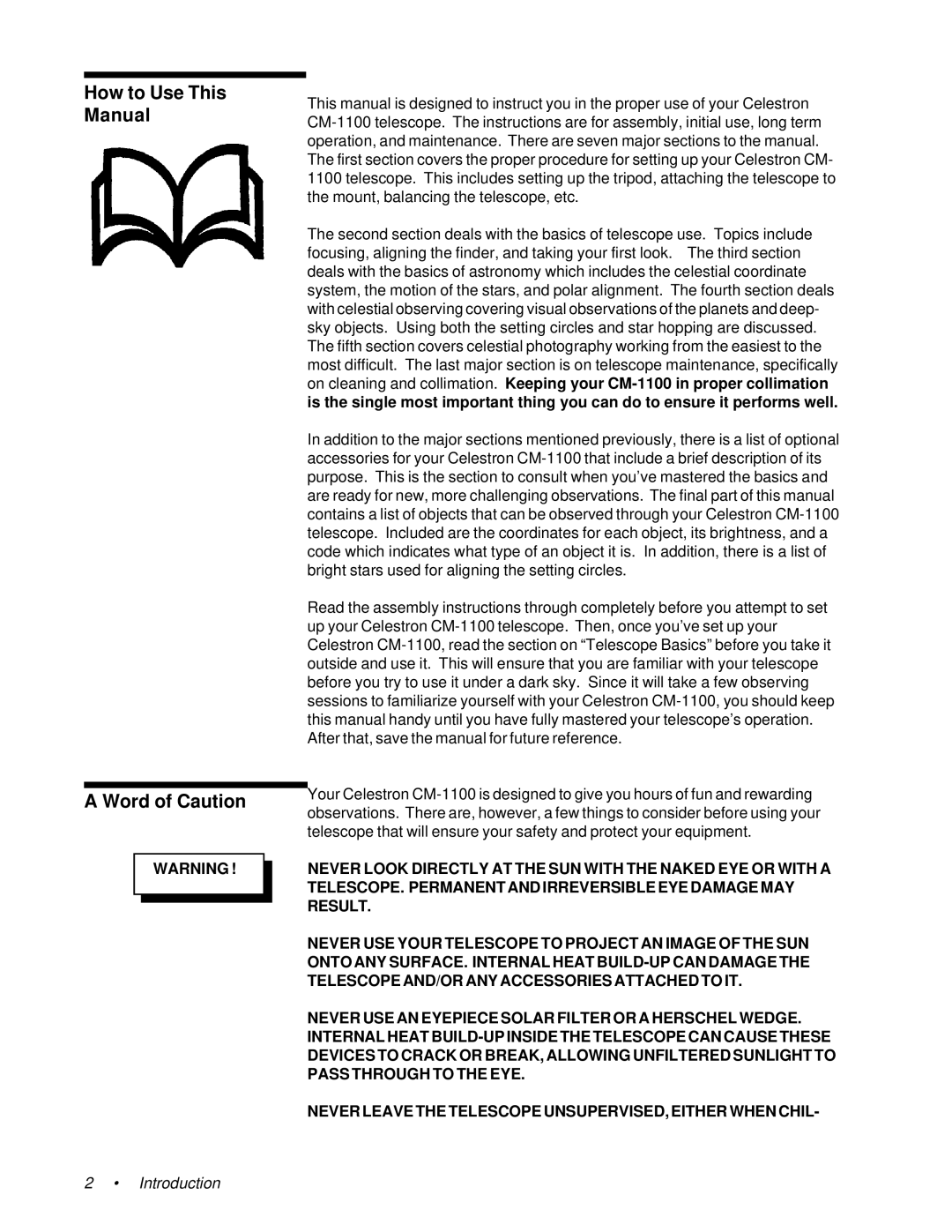This manual is designed to instruct you in the proper use of your Celestron CM-1100 telescope. The instructions are for assembly, initial use, long term operation, and maintenance. There are seven major sections to the manual. The first section covers the proper procedure for setting up your Celestron CM- 1100 telescope. This includes setting up the tripod, attaching the telescope to the mount, balancing the telescope, etc.
The second section deals with the basics of telescope use. Topics include focusing, aligning the finder, and taking your first look. The third section deals with the basics of astronomy which includes the celestial coordinate system, the motion of the stars, and polar alignment. The fourth section deals with celestial observing covering visual observations of the planets and deep- sky objects. Using both the setting circles and star hopping are discussed. The fifth section covers celestial photography working from the easiest to the most difficult. The last major section is on telescope maintenance, specifically on cleaning and collimation. Keeping your CM-1100 in proper collimation is the single most important thing you can do to ensure it performs well.
In addition to the major sections mentioned previously, there is a list of optional accessories for your Celestron CM-1100 that include a brief description of its purpose. This is the section to consult when you’ve mastered the basics and are ready for new, more challenging observations. The final part of this manual contains a list of objects that can be observed through your Celestron CM-1100 telescope. Included are the coordinates for each object, its brightness, and a code which indicates what type of an object it is. In addition, there is a list of bright stars used for aligning the setting circles.
Read the assembly instructions through completely before you attempt to set up your Celestron CM-1100 telescope. Then, once you’ve set up your Celestron CM-1100, read the section on “Telescope Basics” before you take it outside and use it. This will ensure that you are familiar with your telescope before you try to use it under a dark sky. Since it will take a few observing sessions to familiarize yourself with your Celestron CM-1100, you should keep this manual handy until you have fully mastered your telescope’s operation. After that, save the manual for future reference.
Your Celestron CM-1100 is designed to give you hours of fun and rewarding observations. There are, however, a few things to consider before using your telescope that will ensure your safety and protect your equipment.
NEVER LOOK DIRECTLY AT THE SUN WITH THE NAKED EYE OR WITH A TELESCOPE. PERMANENT AND IRREVERSIBLE EYE DAMAGE MAY RESULT.
NEVER USE YOUR TELESCOPE TO PROJECT AN IMAGE OF THE SUN ONTO ANY SURFACE. INTERNAL HEAT BUILD-UP CAN DAMAGE THE TELESCOPE AND/OR ANY ACCESSORIES ATTACHED TO IT.
NEVER USE AN EYEPIECE SOLAR FILTER OR A HERSCHEL WEDGE. INTERNAL HEAT BUILD-UP INSIDE THE TELESCOPE CAN CAUSE THESE DEVICES TO CRACK OR BREAK, ALLOWING UNFILTERED SUNLIGHT TO PASS THROUGH TO THE EYE.
NEVER LEAVE THE TELESCOPE UNSUPERVISED, EITHER WHEN CHIL-

